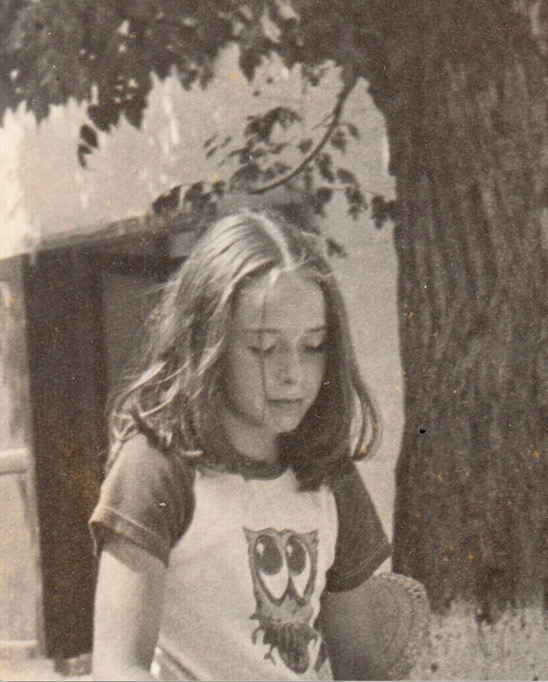Age 11
Somewhere in the German countryside I found a ten year old girl in a ditch. She was slightly emaciated, covered with grime, and lame. She had been thoroughly discarded by a man who had previously been like a caring father to her. She was waiting for that father to come and get her our of that ditch.
This was the image that came to me as I tuned into this part of myself, a part that was formed after I was ditched in the worst possible way in 1973. The denial of this part was still hiding behind my conscious mind, informing decisions and my outlook on life. She could not recover from the shock.
What is denial? It is a state of incomplete trauma. It is the condition of being stuck in the very first stage of unprocessed trauma: shock and disbelief. It is the prolonged inability to believe that the parent you thought loved you, only used you.
Denial precedes healing. Denial gets projected onto everything concerning love in adult life through power dynamics. In the role of the child, you are rejected, again and again. In the role of the adult, you get to do the rejecting. And we mostly switch roles all the time, depending to whom we give our power, hoping in vain for them to return our love, and those who give us their power, and we get to choose to hurt them, or not.
Depending on the emotional magnitude of the underlying trauma, these roles become more rigid. You can find yourself devoting your entire life to an abusive guru or spiritual leader, protecting their bad habits, watching as they engage in sexual assault, without ever wavering in your love, hoping in vain they will one day return it. Others with similar unresolved trauma will all flock to such a power addicted guru, and offer their love, believing they are receiving much from the guru when such a guru only takes. This denial can be so strong that when victims start to speak up about this guru, followers staunchly defend him, deflecting his behavior and blaming the victims.
Why is it so difficult to wake up from denial? Because the reality is that the person you revere - as well as the original authority figure they represent - never loved you at all. This reality is the opposite of what you had to believe to survive. The emotional distance necessary to travel from your belief to the reality is too great. To wake up from protecting someone whom you give your power, you need to allow yourself to know that everything you valued was a sham, that this person you thought was so special didn’t have special powers, that they stole the love you freely gave to them to feed their power addiction, that they exploited you and everyone else who came near them, that they were incapable of loving, that they filled the emptiness created by lack of self-esteem with power, and you filled the emptiness created by your lack of self-esteem with your investment in their power, so it would rub off on you. You have to acknowledge that everything you believed you received was never given to you by that power figure, but was what you gave yourself through your own childlike love that opened your heart and had you believe you were receiving this wonderful feeling through them.
To wake up from protecting an authority figure from your life, you have to look at the pain of your deeper past you’ve been escaping your entire life, an escape in which you found this power addict, perhaps your career, and found yourself in a constant, familiar repetition of emotional strands of your unresolved childhood trauma, through what you believed you got and the emotional repetition of what you did not get. To wake up means that you have to acknowledge that your entire life has been invested in something that was worthless, and that you were spiritually and emotionally stuck, even as your worldly power and status increased.
I was recently triggered and knew I had work to do - look beyond the shock and disbelief I felt about this person in the present and take the charge away from them - to find the original cause of the emotional story that had been revived and playing itself out on my body/mind system. This work led me to the girl in the ditch. I began my own journey out of denial, out of my own emotional protection of a perpetrator.
When at nine years old I was trafficked on a private jet and brought to the US by the American man who became the most important father figure I ever knew. I absorbed his attention with all the love of a child who had only known derision and abuse. He instructed me in recognizing good food, art and clothing, giving me a big taste of the finer things of the world, and I knew why - he said it himself - it was because I belonged. With him, in his family, in his class of people, I thought. He had recognized sophistication and intelligence in me and appreciated these qualities so much that he wanted to invest in my upbringing, with the intention of creating a life for me that was very different from what I had known up until then. Sure, there was the sex, but in his mind, with which mine was yoked without any room for distance, sex with children was normal.
He had introduced me to the staff in his homes as his niece from Paris and would speak French to me. The friendly maid brought breakfast to the bed where he and I lay together, and the butler came in with the business of the day, acting as if it was the most normal thing in the world. The crew that led us onto his sailboat were also all smiles, acting as if I belonged and everything was completely normal. I felt that I belonged somewhere at last. I felt loved.
About one year later, after I had been fully schooled on what it meant to belong - not to his family or even his class of people, but to his cult - I did the one thing I knew would be completely unacceptable; I rebelled. Angry and shaking with fear, I complained about a recent instance of being kidnapped and horribly abused and humiliated by a female singer and her husband. It was not the real reason of my rebellion: that was the horrific price I’d had to pay to be part of his cult, but this abuse was not meant to have happened, and I thought I could start there. I was not meant to be abused by women, let alone kidnapped and humiliated. In an instant, he completely transformed. His face turning into a mask of disgust, he scoffed:
“I’ve wasted my time on you. You didn’t deserve all the attention you got. You were born lowly because that is where you belong. You don’t deserve anything good. You’re vulgar and disgusting and you always will be poor because you have no class.”
I felt my entire world slipping away. I felt I had made an enormous mistake by getting angry. I felt that I was vulgar and should have kept calm and poised. I did not want to be part of his cult, but I did want his love. I thought I would do anything to change his mind. I cried desperately, promising to be good, grabbing his leg, while he looked down upon me as an annoying bug on his pants, prying me off. As I held on, he used all his strength to release my clasp and pushed me onto the floor. I lay on my back as he made for the door and ordered two handlers to grab me. He parted with the verbal message that I was worthless, a waste of space.
In the following days, I was tortured to be reprogrammed, before being picked up by Belgian handlers and driven back. I saw many ditches out of the window during the long ride home. Part of me remained in a ditch in the German countryside, prostrate, lame, waiting for his return, covered in the grime he had put on me. I couldn’t believe that he really did not care about me. I had to believe that what had felt so much like love to me for an entire year, really had been love, because I had needed it to live.
For nearly half a century I protected the childlike love I felt for him, refusing to believe that he had groomed me to be a sex slave from the start, refusing to believe that the relationship had been entirely exploitative on his end, refusing to believe he had only educated me in the ways of privilege so that I could be a better slave for him.
The grief of the past few days has adjusted my child’s view of being loved to the reality of the complete, psychopathic exploitation I actually experienced.
Denial, to some degree, is necessary to survive in a world that in this moment is still run by psychopaths, structured to help them better exploit us. We cannot fathom that the glue holding the Western Capitalist system in place is pedophilia. It is too difficult to believe the things psychopaths do - it is too extreme, too far-fetched. It is hard to see that the gurus and other sexually abusive leaders of smaller power structures are successful because they copy the abusive behavior of the world leaders, if only in minor ways, and that this is the reason it is so hard to bring about change.
It may be too difficult to accept that the entire way the world is structured is a sham, that our lives are filled with brainwashing to keep this sham going, to keep us believing that we need these external authority figures to tell us how to live, to tell us what to do to be happy, to keep order in the world. It is too difficult to accept that we have all the power we need within ourselves, and that we are far better equipped to run the world as are the current leaders.
It may be too difficult to accept that the world structure is completely upside down: that those who have power are the ones who need our strength to begin to heal.
It is easier to stay in denial, to blame victims and see them as perpetrators, and to follow along with the vertical power paradigm and replace that lack of love with power and privilege.
It is through denial that each person becomes personally responsible for the world’s darkness. Thankfully, there are increasingly more people with enough courage to begin to change. There are enough people who can face the monsters of their own past and break free from their childlike view of authority figures, whether these are gurus, billionaires, politicians, influencers - anyone that needs you to follow them. There are more and more of us waking up from our denial.

